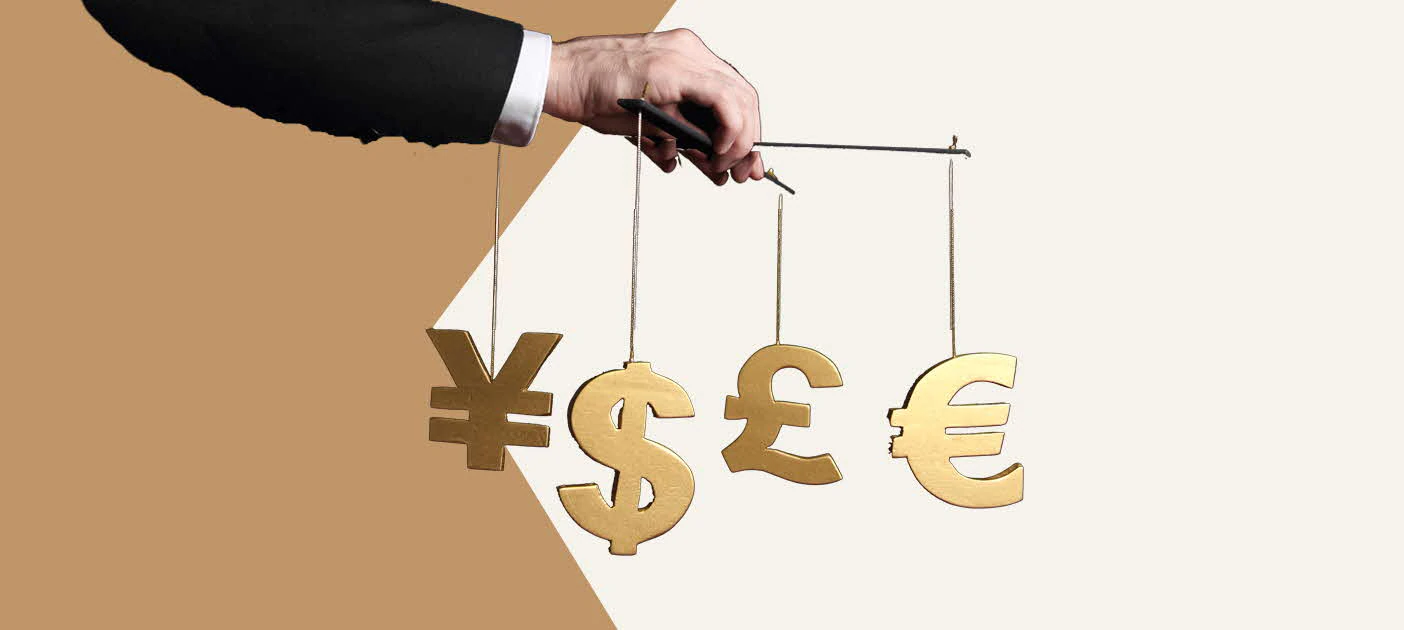| All currencies are valued against another currency, so they are always expressed as pairs. | |
| Various factors affect the value of currency, the changing value of currency is what provides opportunity to trade. |
WHAT IS CURRENCY?
Currency is generally defined as a ‘token’ used widely as a medium of exchange within an economy or a country. The Cambridge dictionary defines currency as ‘the money that is used in a particular country at a particular time’.
The idea of currency being a token stems from the fact that in general, the face value or monetary value of a currency exceeds its cost of production. So the paper and ink of a $100 note is worth less than $100 in value.
We are all familiar with cash, which is held in different currencies, depending on which country you are in. Each currency is represented by a symbol, which you will need to know when looking up financial or trading websites.

THE VALUE OF CURRENCY
All currencies are valued against another currency, so they are always expressed as pairs. So USD/HKD stands for US Dollar valued against the Hong Kong Dollar.
When you come across statements like ‘the Yen tumbled’ or ‘the Aussie dollar strengthened’, these refer to the fall or rise of a currency against another. Typically, the default benchmark is the US Dollar. So, if we say the USD/JPY went from 100 to 102, this means the US Dollar gained in value against the Yen. Conversely, the Yen ‘fell’ against the US Dollar.
This changing value of currency is what provides an opportunity to trade for gains.
ECONOMIC FACTORS THAT AFFECT THE VALUE OF CURRENCY

These factors affect the supply and demand for a currency.
- If certain economic events make a currency more attractive, demand increases against a limited supply and the currency can command a higher price.
- On the other hand, when another currency becomes less attractive, owners of that currency may want to offload it as soon as possible. If there is a shortage of buyers, the price will fall.
Most developed economies’ currencies are valued this way, known as the ‘free float’, including the US Dollar and the Yen.
Some currencies are ‘fixed’ or ‘pegged’ against another currency. An example of this is the Hong Kong Dollar, which is fixed in value against the US Dollar.
There are also currencies like the Singapore Dollar where the value is determined by a mix of market forces (demand and supply) and occasional central bank intervention to keep the currency value within a range. This is a ‘managed float’.
Risk Disclosure and Important Notice
The information herein is for information only. DBS accepts no liability whatsoever for any direct, indirect or consequential losses or damages arising from or in connection with the use or reliance of this publication or its contents
Investment involves risks. The information provided is based on sources which DBS Bank Limited and DBS Bank (Hong Kong) Limited believe to be reliable but has not been independently verified. Any projections and opinions expressed herein are expressed solely as general market commentary and do not constitute solicitation, recommendation, investment advice, or guaranteed return. The above information does not constitute any offer or solicitation of offer to subscribe, transact or redeem any investment product. Past performances are not indicative of future performances. You should make investment decisions based on your own investment objective and experience, financial situation and particular needs. You should carefully read the product offering documentation, the account terms and conditions and the product terms and conditions for detailed product information and risk factors prior to making any investment. If you have any doubt on this material or any product offering documentation, you should seek independent professional advice.
Foreign exchange involves risk. Customers should note that foreign exchange may incur loss due to the fluctuation of exchange rate.
RMB currently may not be freely convertible and is subject to exchange controls and restrictions. There is no guarantee that RMB will not depreciate. If you convert Hong Kong Dollar or any other currency into RMB so as to invest in a RMB product and subsequently convert the RMB sale proceeds back into Hong Kong Dollar or any other currency, you may suffer a loss if RMB depreciates against Hong Kong Dollar or other currency.
The information provided above have not been reviewed by the Securities and Futures Commission of Hong Kong or any regulatory authority in Hong Kong.





